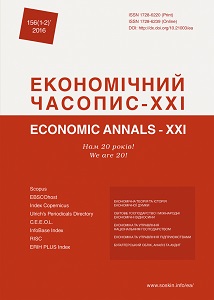Contemporary Russia as a Palace-neopolitar State and Economy
Contemporary Russia as a Palace-neopolitar State and Economy
Author(s): Igor PiliaievSubject(s): Economy
Published by: Institute of Society Transformation
Keywords: Power-property; Palace State; Horde; Russian Federation; RUSNANO
Summary/Abstract: In the context of the apparent failure of Russia’s attempt to modernise itself during the post-communist period of its being, one of the actual tasks for social sciences is to identify the nature of the state and the economic system of contemporary Russia as well as historically determined dominants of its development in the foreseeable future. The article offers to solve that task through an inter-disciplinary junction of most relevant concepts of the politar/neopolitar economy, studying the Horde genesis of Muscovy-Russia, its political and historical notions of the «palace state». The Putin Russia’s historical roots are traced from early class politar societies of Asia and Aegeide, especially the Cretan «palace» states all through the 2nd millennium BC, through the post-Horde Muscovy and the post-Petrine Russian state «privatised» by nobility, up to a number of communist and oligarchic dictatorships of the 20th century. The mechanisms of a large-scale redistribution of assets accumulated in power-property of Russia’s ruling elite are outlined through the case study of the RUSNANO state-owned company specialising in nanotechnologies. In contrast to the present day Ukrainian economy (being predominantly neo-feudal but with a dynamically developing segment of capitalist relations of the European type), in Russia under Putin one can observe the phenomenon of two-tier property, which is characteristic of politar societies, i.e. while this property is officially registered in the name of legal entities and individuals, its supreme owner and arbiter is actually the top-brass of the federal bureaucracy acting on behalf of the entire ruling class. Thus, the socio-political and economic system of contemporary Russia may be identified as palace-neopolitar, wherein the top bureaucratic oligarchy has usurped power controlling and redistributing, the core economic resources and assets of the country with the purpose of its own utmost enrichment. Moreover, due to the escalation of the systemic conflict of Russia with the West and, more broadly, with the world of modernity, further consolidation of the palace-neopolitar power and economy, which brings under control and increasingly distorts the segment of competitive market relations, is taking place. The above means that the unlikely success of today’s Russian modernisation would threaten the very foundations of the Russian statehood.
Journal: Економічний часопис - ХХІ
- Issue Year: 156/2016
- Issue No: 01+02
- Page Range: 4-8
- Page Count: 5
- Language: English

